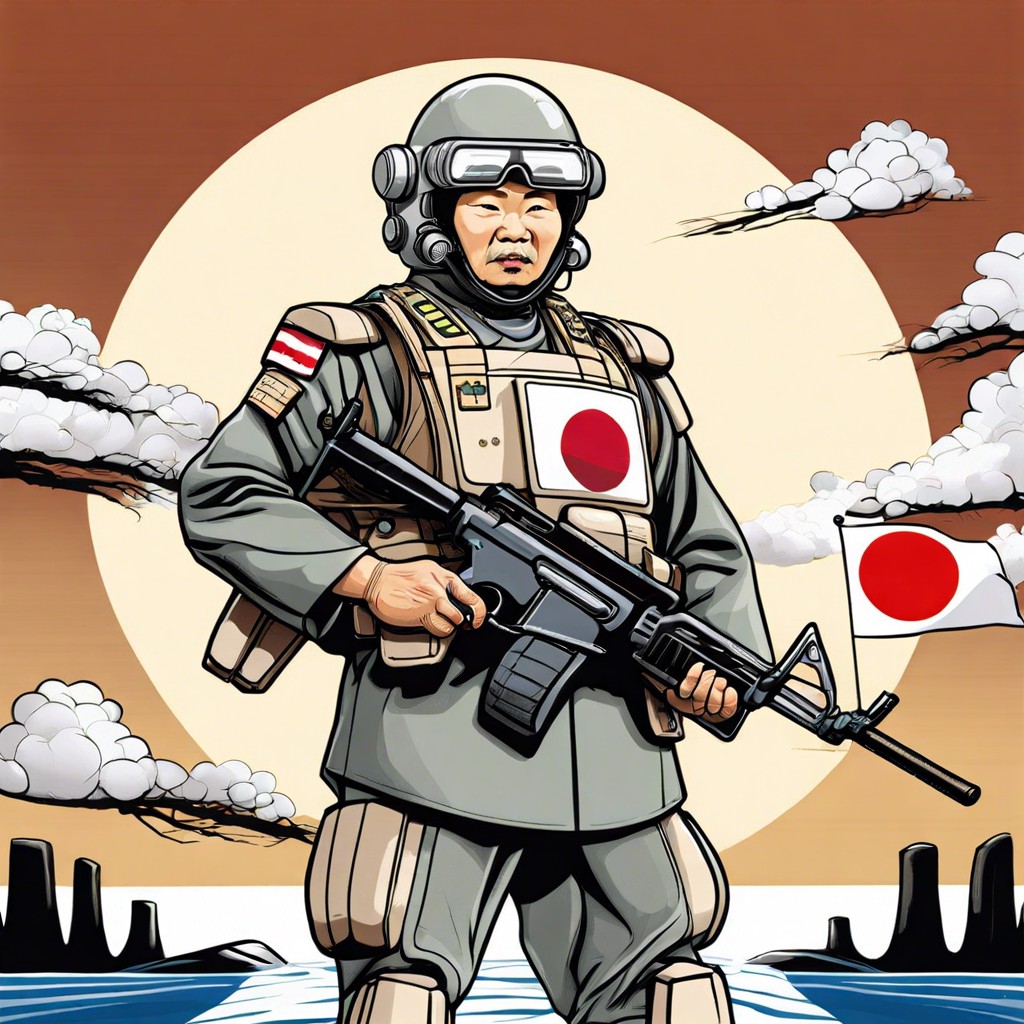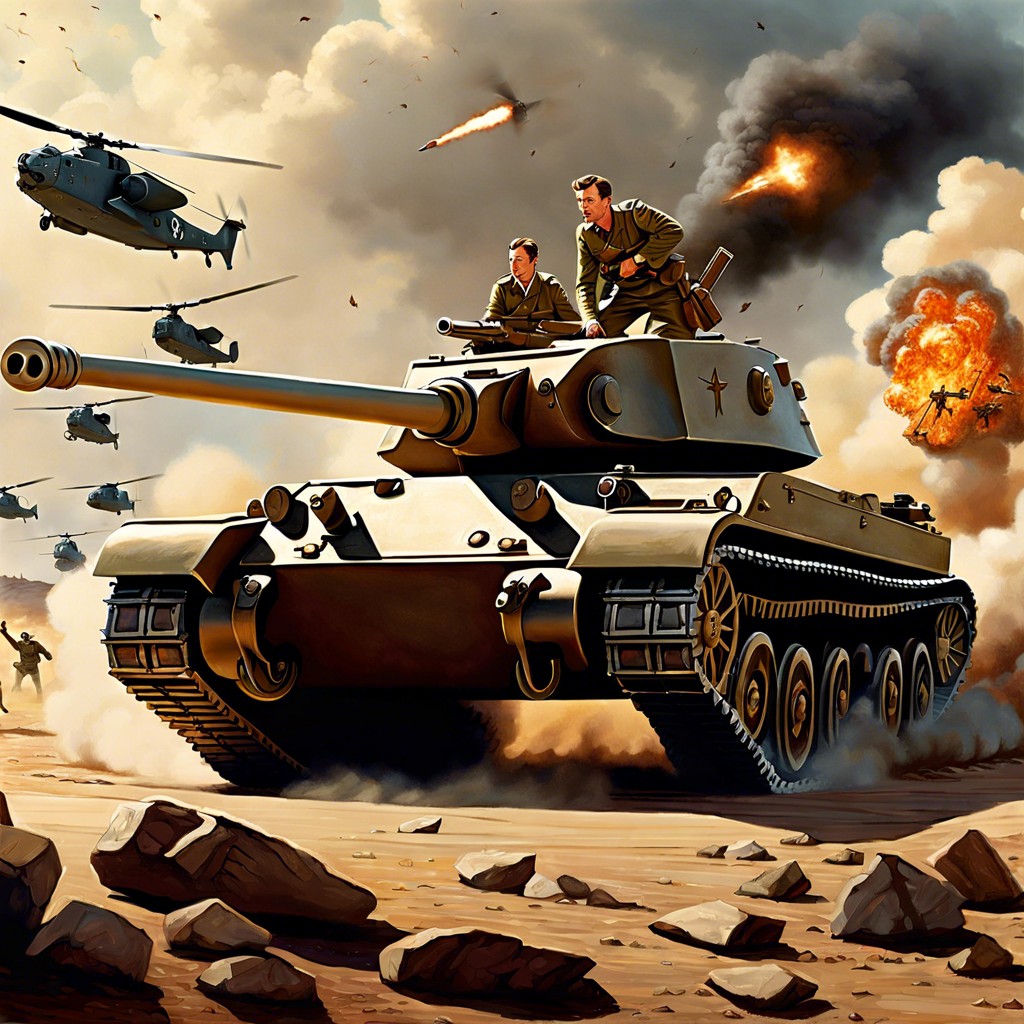Discover an alternate history scenario by pondering how the world might have changed if Japan had won World War II.
Imagine a world where sushi replaced burgers, Tokyo rivaled New York as the financial capital, and samurai code dictated laws. If Japan had won WWII, the Axis powers would have carved up the globe like an overambitious potluck dinner, resulting in a seismic shift in geopolitical frontiers, cultural norms, and economic networks. Dive in to uncover the alternate reality where East meets West and ninjas might just be running your neighborhood watch.
Key takeaways:
- Japan dominates East Asia; China, Korea, Southeast Asia puppet states.
- Tokyo becomes global powerhouse, shifts focus to Pacific trade routes.
- Cultural fusion: sushi popular, Japanese language taught, fashion blend.
- Asian markets lead global trade, Western economies decline, Japan influences resources.
- Japanese tech advancements, robotics household norm, military innovates fast.
Geopolitical Landscape in East Asia

Had Japan emerged victorious, the saga of East Asia would read quite differently. Imagine Tokyo calling the shots across vast expanses, dictating terms, and establishing satellite states.
First off, China might have splintered into several puppet regimes. A fragmented China would mean no superpower showdown with the United States decades later. Picture a chessboard where all the pieces salute the same emperor.
Korea? Well, unified under Japanese rule, there wouldn’t be a North and South Korea. No Kim dynasty; no K-Pop. Just “JP-K.”
Southeast Asian countries would find themselves under Japanese influence, forming an extended imperial network. Thailand as Japan’s sidekick, Malaysia, and Indonesia as resources hubs—an empire spanning the tropics.
Even the Philippines might be speaking more Japanese than Tagalog. The US bases would be replaced by Japanese ones, making sushi on a beach in Manila a reality.
Politics would dance to Tokyo’s tune. Western powers like the UK and France would have to cozy up to Japan, shifting the Cold War and beyond.
Changes in Global Power Dynamics
Imagine a world where Tokyo becomes the new epicenter of global affairs. Suddenly, English isn’t so dominant. Instead, kids worldwide are learning Japanese in school, dreaming of sushi lunches and manga afternoons.
The United States wouldn’t be a superpower anymore, more like a middleweight boxer who once held the title. Europe, reeling from its own wars, would scramble to ally with the new Asian powerhouse.
Colonial empires might hold on a bit longer, with European powers too distracted to support independence movements. The Cold War, if it happens at all, shifts east, and Moscow twiddles its thumbs nervously.
Trade routes and relationships would be revamped. Forget the Atlantic-centric focus; get ready for a Pacific century. Industries, arts, and innovations originating in Japan would become the new gold standard. That “Made in Japan” label—you’d hear angels sing every time it appeared.
Cultural and Societal Shifts in Conquered Regions
Imagine a world where sushi is as popular as hamburgers across Southeast Asia. Conquered regions would likely see a fusion of local customs with Japanese traditions.
Japanese language might dominate education systems. Schools outside Japan could be teaching kanji and katakana. “Homework” could include origami or tea ceremony etiquette.
Traditional holidays might blend. Envision a Vietnamese Lunar New Year with a sprinkle of Japanese cherry blossom festivals.
The fashion scene could merge kimonos with traditional garments. Sarongs-meet-kimonos anyone? Sounds quirky, but fascinating.
Pop culture would transform too. Karaoke bars could become the nightlife norm. A mix of local music with Japanese pop idols might play on every radio.
Culinary arts would definitely see a mix. Think tempura with Thai spices or ramen-based Malaysian laksa.
All in all, societal and cultural realms would embrace a quirky and dynamic East-Asian fusion.
Economic Consequences and Trade Networks
Unsurprisingly, the economic blueprint of the world would look drastically different. With Japan’s dominance, Asian markets would likely become the epicenter of global trade.
First, Western economies might see a decline. The balance of power shifting towards Asia could mean Europe and the United States struggling to maintain their previous levels of influence.
Second, Japan would probably integrate the economies of its occupied territories into a vast network. Think of a sprawling spiderweb of trade, connecting everything from Southeast Asia to the Pacific Islands.
Moreover, resource distribution would get a makeover. Oil from Indonesia, rubber from Malaysia, and other key commodities could flow predominantly towards Japan, potentially creating shortages in other parts of the world.
Finally, a Japan-led economic bloc would necessitate new trade routes and agreements. The Silk Road might make a dazzling comeback, albeit with bullet trains and cargo ships. It would be fascinating yet chaotic—a real-world Monopoly game on steroids.
Technological Advancements and Military Innovations
Imagine a world where sleek, zero-emission vehicles and futuristic bullet trains dominate the global market. Japan’s wartime push for technological excellence would accelerate innovation. From electronics to artificial intelligence, Japanese tech might have evolved faster and with different priorities, altering the world’s digital landscape.
Robotics could become household standard, making debates over house chores obsolete. Think Asimov’s dreams becoming daily reality.
Don’t forget military marvels. Advanced aircraft, naval power, and missiles would set new standards. Cybersecurity? Yeah, they would probably be early adopters. Ghost in the machine? More like everyday protocol.
Alternative history wouldn’t just look fascinating in Nintendo games; it might be a part of our daily grind.




